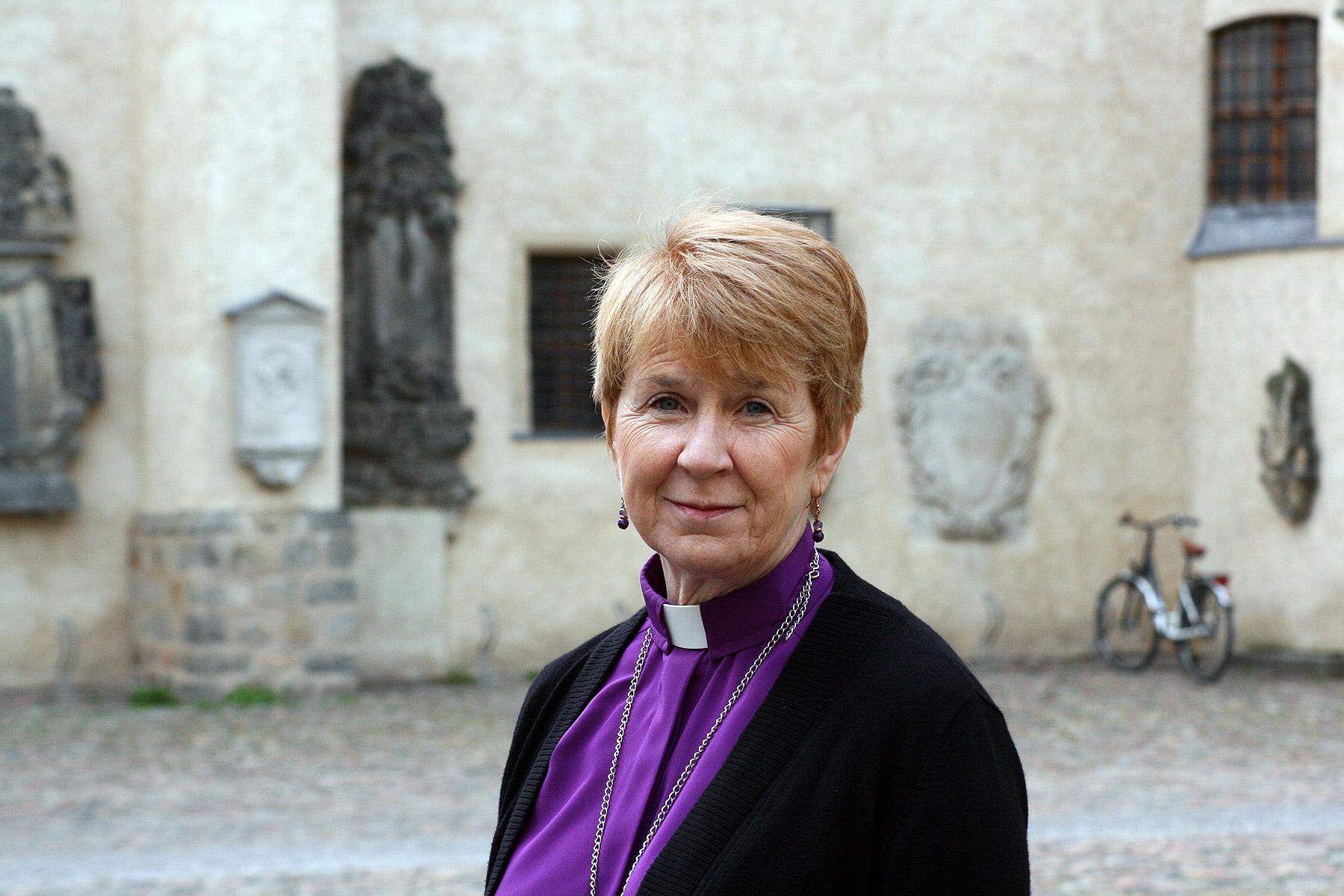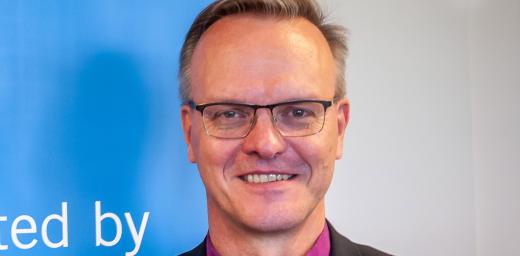God’s gifts to care for our neighbor

Bishop Deborah Hutterer of the Grand Canyon Synod, Evangelical Lutheran Church in America. In this Voices from the Communion interview, she talks about the churchâs ministry of serving migrants, changing populist rhetoric, and being open to change. Photo: LWF/A.Weyermülle
Voices from the Communion: Bishop Deborah Hutterer, ELCA
(LWI) – Rev. Deborah Hutterer was elected Bishop of the Grand Canyon Synod in the United States in September 2018. The synod of the Evangelical Lutheran Church in America (ELCA) contains counties in Nevada, Utah and Arizona, a state bordering Mexico, where the church is assisting migrants. In this interview with Lutheran World Information, she talks about this ministry, changing populist rhetoric, and being open to change.
How do you experience the cross-border migration?
Before I became bishop, I worked with Lutheran Social Services (LSS). The government asked LSS to help with the reunification of migrant families who had been separated at the border and then put into detention. When it became public, the government was under a court order to put them all together.
When people arrived, they had only been reunited with their children for a couple of hours, sometimes even minutes. We tried to create a safe and welcoming space, and asked pastors who spoke Spanish to be available. I remember a mother, who had just been reunited with her child. The mother would not let go of the child, but when she and the pastor were talking, the child came out from behind the mother, tugged on the pastor’s shirt and asked: Pastor, where have you been?
Isn’t that the question for the church: Where have we been?
As Bishop of the Grand Canyon Synod, how did you continue that ministry?
When ICE (Immigration and Customs Enforcement) dropped thousands of migrants in the streets of Phoenix last summer, we opened churches at night so they had a safe place to sleep, food, and transport to their relatives in the US.
Now the law has changed, you can no longer enter the US if you have crossed through another country. If you come from El Salvador, Honduras or Guatemala, you have to apply for immigration in Mexico.
We have a joint Episcopal and Lutheran ministry at the border in Nogales, Mexico, providing shelter for people waiting for their interview. The place holds about 70 people, who stay 5-6 weeks. We make sure that while they wait, they are treated humanely, and safe. Some people are trying to escape drug cartels and sex trafficking. Everyone has a different story, but we do know that some people are seeking asylum to escape violence.
The problem is, we are trying to fix the system, but these are people standing right in front of us. What did God give us to do to care for the neighbor, who is right in front of us?
How is this work perceived in the congregations?
I think the personal exchanges help people to see that migrants are not so different from us. Sometimes, people in political position say that people who seek asylum or who are migrating are terrorists, or drug dealers. Having these interactions, helps see each other as human beings and understand humanitarian needs.
We plan to bring people across the border, to challenge the stereotypes and to give them good solid information. We hope that they will take these stories back to their congregations.
How do you fund this ministry?
Lutheran congregations in Nevada and Arizona have collected money, clothing and shoes, even toys, so that we can help people wait for their interviews with immigration more comfortably. People usually come with the clothes they are wearing only. The money is used to pay the rent on the Mexican side and buy the food that is needed. As a synod, congregations and individuals who have a heart for this ministry provide funds and donations that go to direct support.
How does populism and hate speech affect your church?
It’s a very difficult time. I’ve heard pastors tell me that whatever they say, it can be interpreted as political, and then people will get angry. When ELCA made a decision to become a sanctuary denomination, people left our church. It is my hope and my prayer that there will also be people who will come, because the church stands for these things.
We also need to bring a sense of humility to admit that we see but one part of a picture, which is very complex and layered. It is only in conversation with each other that we will get a better view of that picture. I try to stick with facts, and to create spaces where we might learn from each other, and understand that it is OK to disagree, but to do that respectfully.
How does being part of the LWF communion influence your work?
To participate in the Retreat of Newly Elected Leaders has been a real privilege. While I am very different from my colleagues in India, Korea or Ghana, we are also very much alike. ELCA is a wealthy church, but we have the same problems as the churches that have fewer resources. Understanding that we are church together will broaden our perspective to be a global church.
I am also hoping that meeting some of my colleagues who have doubts about female clergy might make them think that female clergy are also a gift to the church. The other thing that I find helpful is really lifting up the topics that are giving us a way to be the body of Christ: gender justice, climate justice, care of creation, immigration, refugees.
Many church leaders talked about attracting young people. How do you go about that?
In a larger sense, it is time that people lack. You could choose so many other things. How do we connect church on Sunday to everyday life? Young people are looking for this real-life connection between the gospel and the world. That’s why the discussions we had here about the priesthood of all believers and living your faith have been valuable.
All too often, we invite people and want them to be like us. We will be different if we continue to engage with people who are not over 70 years old and white. Remembering that will be helpful for the church.
It is also important to be honest about the realities. Saying all are welcome will mean that when you come to our door, we are going to change. All too often, we invite people and want them to be like us. We will be different if we continue to engage with people who are not over 70 years old and white. Remembering that will be helpful for the church.
What does it mean for you to be the church today?
Now, there is an easy question! A part of this is about proclamation, we need to be witnessing to Jesus in word and deed. There are churches that are doing many social ministries, but sometimes we forget to say that we do this, because God loves us, and we love our neighbor. The book of Acts is one of my favorite stories, because the first Christian churches would communicate why they did what they did.
Sometimes being church means letting go of the old and trusting God will create something new. That is scary, because you only know what you know, and it requires trust in God. Part of being the church is looking at and pointing to these new things God is doing.
The Lutheran World Federation is a global body that shares the work and love of Christ in the world. In this series, we profile church leaders and staff as they discuss topical issues and set out ideas for building peace and justice in the world, ensuring the churches and communion grow in witness and strength.



